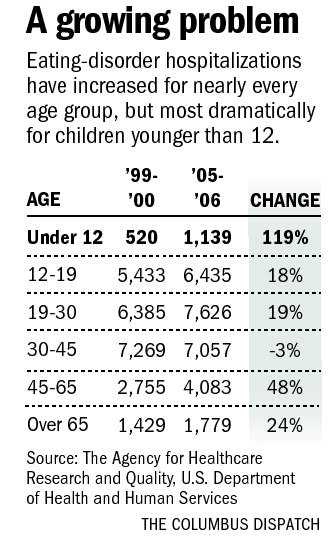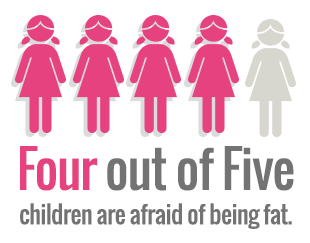Eating Disorders In American Society
Make Me Beautiful
Perfection; something we all try to achieve, but very few feel that they actually accomplish. We are inundated daily with images of what is ‘perfect’ – gorgeous hair, flawless skin, shiny white teeth…. and a fat-free physique.
For many people today, the images we see daily of models, celebrities, and icons usually show impossibly thin women and unnaturally fit males. We are told that what we see is the definition of beauty, and that what we see is what we should try to be. For some people, that means taking the idea of the ‘perfect body’ to a new extreme.
In general, sufferers of eating disorders are not outwardly the kind of people anyone would expect to have a kind of mental illness. They are usually perfectionists, obsessed with improving themselves until they have reached the ever-unattainable goal of perfection. They are usually overachievers, hard working and eager to please. Sometimes they are the star of the football team, or the homecoming queen, or the president of the student body. But it is often their own body that causes them the most stress.

Eating Disorders in America
In the United States alone, it is estimated that about 24 million women and men suffer from an eating disorder, as per the National Association of Anorexia Nervosa and Associated Disorders. These disorders can seriously affect the health of the sufferer, and in the most extreme cases, can often result in permanent damage or even be fatal. Many different factors can trigger an eating disorder. Sometimes the cause is biological, where the individual experiences a close relative struggling with the disorder, and develops the symptoms themselves. Recent studies have shown that low levels of serotonin may also trigger an eating disorder.
Most often the cause is underlying emotional or mental issues, which may cause a person to feel the need to change their physical appearance in order to maintain control in distressful situations. These kinds of triggers may be anger management issues, problems within a relationship, family conflicts, or even puberty. Most often, young women and teens develop eating disorders because of emotional issues common to young-adulthood.

Have you ever suffered from one of these conditions? (Answers are anonymous)
The Many Faces of the Need to be 'Skinny'
There is a wide range of behavior that may constitute an eating disorder, encompassing everything from food denial, to over eating, to bingeing and purging. The most common form of eating disorder is known as anorexia nervosa. This behavior is classified by the Anorexia Nervosa and Related Eating Disorders group (ANRED) as “the relentless pursuit of thinness.” Most sufferers of this disorder will often deprive themselves of food or exercise compulsively. Anorexia sufferers often have the highest mortality rate of any eating disorder; up to 20 percent of those with the disorder will not survive it.
Other common forms of eating disorders are bulimia nervosa and binge-eating disorder. Bulimia sufferers often enter a ‘binge and purge’ cycle with food, where they will over-eat, and then induce vomiting to rid their bodies of food. Those with the disorder often eat in secret, and develop a sense of guilt about eating. To rid themselves of the guilt – and the food – they often induce vomiting, over-exercise, or abuse laxatives, which causes them to feel a dual sense of relief, from both the actual substance of food and from the guilt they feel for eating.
Those with binge-eating disorders often use food as a method of managing depression and anxiety. They too often eat in private, to hide their issues with food from others. For many sufferers, eating when sad becomes a compulsion, and an easy way to feel better when other methods don't seem to work. This can often lead to unhealthy eating habits, obesity, and harmful "yo-yo" dieting which can lead to many permanent health problems.
Majority of eating disorders are caused by, or eventually develop, a condition called 'body dysmorphic disorder.' According to the Mayo clinic, BDD is a chronic mental illness in which the sufferer believes there is a flaw in their appearance, and often they can't be convinced otherwise. In relation to many eating disorders, those with BDD often believe that they are 'fat' or unattractive, and often drastically alter their eating habits to try to alter what they perceive to be an 'imperfection.'
This can occur in people of any and all body types, not merely skinny people who believe they are large, as is the common misconception, and can also occur in males, females, transgender, the elderly, the young, and anyone in between. It is important to to recognize that this is a disease, and to treat the condition with patience and respect, as well as to encourage physical treatment in the form of therapy or medication, if necessary.
It is important to never pass judgement on someone with this disorder, and to be on the look out for tell-tale signs if you suspect someone may be suffering from the disorder.
Eating Disorders Can Affect Anyone


Who Is Really To Blame?
Everyday, people around the world are told what is beautiful by the media, society, and many other social constructs. This often leads people, men and women alike, to have a poor self-image, and occasionally to change their eating habits to try to become what the world has told them is beautiful. However, while it seems easy and logical to place the blame on the modern world for these feelings of inadequacy, the sad truth is that eating disorders have been around since history was first recorded. Ancient Egyptians and Persians used to starve and binge for religious events and acts of penance, the ancient Romans were infamous for their indulgence and purging of food, and in the 18th century, religious devotes would starve themselves to extreme thinness, often as a way of showing their ability to conquer baser appetites.
What Can Be Done In The Future
It was just as important for perfectionists of the past to pursue the image that society claimed to be beautiful. For now, the world and the media will continue to dictate what is beauty, and what is perfection. As a society, we can only continue to remind each other and future generations that beauty is something that comes from within, and that one’s weight is not equal to one’s worth. Some young people will still develop an eating disorder, but by increasing awareness and decreasing the stigma, we can ensure that help will always be available. Perhaps one day, society will stop buying into the cult of ‘skinny,’ and real beauty will be the new equivalent for perfection.
For More Information
For More Information on these conditions and what can be done, please visit:








